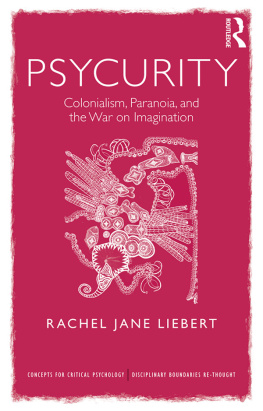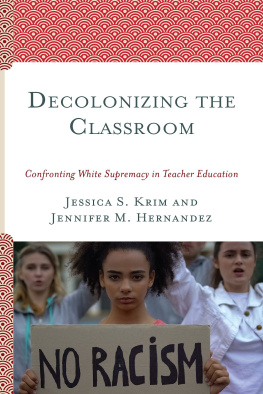
PSYCURITY
Across the world, the rhetoric and violence of white supremacy is rising up. Yet, explanations for white supremacist attacks typically direct attention toward an unreasonable, paranoid state of mind, and away from the neocolonial security state that made them.
Offering a response to US expressions of white supremacy, Liebert reads paranoia as a dis-ease of coloniality by following its circulation within the ultimate place of reason, indeed a key arbitrator of it: Psychology. Through reflexivity, interviews, participant observation, scientific artefacts, and public art, this unique work seeks to argue for and experiment with unsettling the entwined coloniality of Psychology and the current political moment, joining with struggles for a world where it is not only white lives that matter. Tracing the spinning cogs and affective coils of the prodromal movement a program of research that, capturing potential psychosis, illustrates the serpentine workings of a control society Liebert argues that, within a context of psycurity , paranoia hides as reasonable suspicion, predicts the future, brands threatening bodies, and grows through fear, thereby seeping into the cracks of white supremacy, stabilizing it. Catching this argument as itself enacting psycurity, she then engages the more-than-human to search for paranoias decolonizing, otherworldly potential; one that may revive the psykhe breath of psychologies too.
Calling for psychologies to leave Psychologys comfort zone and make space for imagination, this performative, interdisciplinary work will engage students, researchers, and activists from an array of disciplines who wish to examine a critical and creative response to present-day racism and fascism.
Rachel Jane Liebert , from Aotearoa New Zealand, has a Psychology Lectureship at the University of East London and a Psychology PhD from the City University of New York. Seeking to breach the genocidal legacies of her settler and intellectual ancestry, she collaborates with decolonizing and feminist scholarship, art, and activism.
Concepts for Critical Psychology: Disciplinary Boundaries Re-thought
Series editor: Ian Parker
Developments inside psychology that question the history of the discipline and the way it functions in society have led many psychologists to look outside the discipline for new ideas. This series draws on cutting edge critiques from just outside psychology in order to complement and question critical arguments emerging inside. The authors provide new perspectives on subjectivity from disciplinary debates and cultural phenomena adjacent to traditional studies of the individual.
The books in the series are useful for advanced level undergraduate and postgraduate students, researchers and lecturers in psychology and other related disciplines such as cultural studies, geography, literary theory, philosophy, psychotherapy, social work and sociology.
Most recently published titles:
Psycurity
Colonialism, Paranoia, and the War on Imagination
Rachel Jane Liebert
Beyond Care
Boundaries to Science, Health and Subjectivity in Capitalism
Owen Dempsey
Queer Politics in India
Towards Sexual Subaltern Subjects
Shraddha Chatterjee
PSYCURITY
Colonialism, Paranoia, and
the War on Imagination
Rachel Jane Liebert

First published 2019
by Routledge
2 Park Square, Milton Park, Abingdon, Oxon OX14 4RN
and by Routledge
711 Third Avenue, New York, NY 10017
Routledge is an imprint of the Taylor & Francis Group, an informa business
2019 Rachel Jane Liebert
The right of Rachel Jane Liebert to be identified as author of this work has been asserted by her in accordance with sections 77 and 78 of the Copyright, Designs and Patents Act 1988.
All rights reserved. No part of this book may be reprinted or reproduced or utilised in any form or by any electronic, mechanical, or other means, now known or hereafter invented, including photocopying and recording, or in any information storage or retrieval system, without permission in writing from the publishers.
Trademark notice : Product or corporate names may be trademarks or registered trademarks, and are used only for identification and explanation without intent to infringe.
British Library Cataloguing-in-Publication Data
A catalogue record for this book is available from the British Library
Library of Congress Cataloging-in-Publication Data
A catalog record for this title has been requested
ISBN: 978-1-138-70179-3 (hbk)
ISBN: 978-1-138-70180-9 (pbk)
ISBN: 978-1-315-20387-4 (ebk)
Typeset in Bembo
by Swales & Willis Ltd, Exeter, Devon, UK
Four years in the making, this book-creature has witnessed a transformative time painful, joyous, loopy, fearful, resolute. I am indebted to the following who kept us tethered during this period. To Michelle Fine for your mentorship, and Sunil Bhatia, Cindi Katz, Linda Alcoff, and Patricia Clough, for your questions, guidance, and openness. To Colin Ashley, Michelle Billies, Ali Lara, Wen Liu, and Akemi Nishida, for the theory, writing, critique, radicality, and wine. To Holli McEntegart, for the magical ideations. And Oliva Holmes for the photography, and Wiremu Woodard for the advice. To the prodromal researchers for your generosity. And Arthur Zitrin for the connection, and Sarah Illingworth and Emily Andrews for Sandy Hook. To el Jardn Etnobotnico de Oaxaca, the people and the plants, for hosting us. And the Public Science Project and Authority Research Network, for incubating my more-than-human praxis. To Priya Chandrasekaran and Stephanie Davis, for your brilliant eyes and fierce hearts. To the New View Campaign, Icarus Project, Occupy Wall Street, OccupyCUNY, Free University, Watching Floyd, The Porn Project, Red Hook Rises, and Outsider Gallery London, for teaching me about mad, gender, racial, and educational justice. And the US, Nepali, Jordanian, and Chilean activists I met during the International Honors Program, especially Kierra Sims and Mabel Cobos, for unblocking me. To Leonore Tiefer for everything. And Nicola Gavey and Virginia Braun, for being such a solid ground. To Adeola Enigbokan, Kendra Brewster, Deshonay Dozier, Monique Guishard, Alexis Halkovic, Amber Hui, Dominque Nisperos, Fernando Quigua, Ola Rayska, Whitney Richards-Calathes, Sonia Sanchez, Puleng Segalo, Kate Sheese, and Jen Tang, for bringing psykhe to our studies. To Rebecca Fullan and Amanda Matles for thinking about white women against white supremacy. To students at the City University of New York, International Honors Program, and University of East London, for doing mystery, ritual, and pausing. To Ian Parker and Eleanor Reedy, for your patience and flexibility. To Fulbright, Bright Futures, American Association of University Women, City University of New York, Jane Douglas, Paul Wiggins, Chris and Di Liebert, Sam Liebert, and Mumtaz Noorani for helping with money. To Fir, for showing me science. And Mum, for showing me art. And Paul, for reminding me. To my ancestors, for keeping me questioning. And the whales (and their riders). And Pirongia, for holding me accountable. And finally, to Tehseen Noorani, for your brain, your play, and your magic. I remember clearly that day, in your Baltimore kitchen, when you asked me the etymology of paranoia and we found that it meant beside-the-mind, forever shifting the shape of this project. Thanks for putting up with me. Ehara taku toa i te toa takitahi, engari he toa takimano.
This strange, passionate and compelling book raises a crucial question about how we read and write in and against psychology. Among the many innovative conceptual questions about the intimate links between the nature of colonialism and distress how the one is normalised and the other is pathologised the book raises a profoundly methodological one. Not only is the treatment of textual material addressed, challenged and reworked so as to transform our understanding of what is usually referred to as data in standard psychological studies, but the way in which we read them is intensively reflected upon. The different kinds of material written and visual are examined and analysed, deeply analysed through the deliberate subjective position of the researcher and writer, Rachel Jane Liebert. She tracks the way discourse and affect are mobilised in what she calls the war on imagination, and she turns our capacity for imagination back on the phenomenon she names as psycurity in such a way as to untangle the way it threads its way into all of our lives.
Next page










